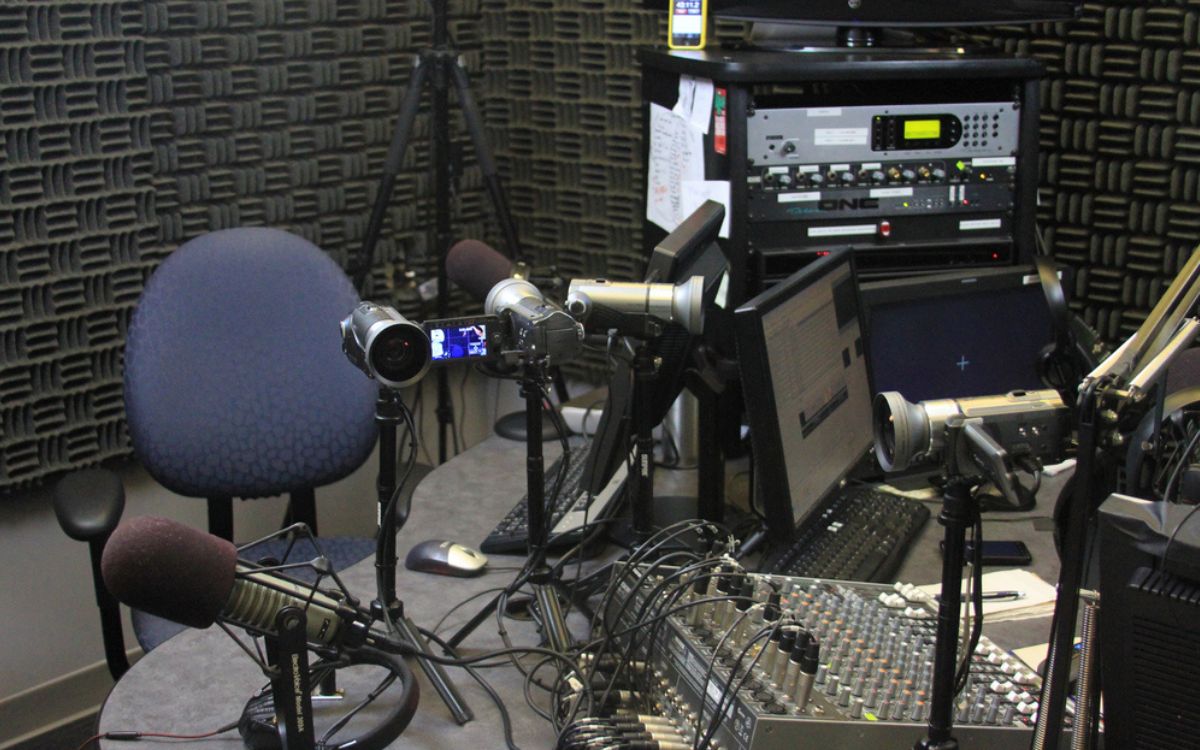Home>Events & Info>Music Therapy>What Exam You Need To Pass To Get Into Music Therapy


Music Therapy
What Exam You Need To Pass To Get Into Music Therapy
Modified: February 2, 2024
Discover the essential exam you need to pass to pursue a career in music therapy and unlock the transformative power of music in healing and wellness.
(Many of the links in this article redirect to a specific reviewed product. Your purchase of these products through affiliate links helps to generate commission for AudioLover.com, at no extra cost. Learn more)
Table of Contents
Introduction
Welcome to the fascinating world of music therapy! In this article, we will explore the field of music therapy and examine the necessary steps to become a certified music therapist. If you have a passion for music and a desire to make a positive impact on people’s lives, then music therapy might be the perfect career path for you.
Music therapy is a specialized form of therapy that utilizes the power of music to address physical, emotional, cognitive, and social needs of individuals of all ages. It is an evidence-based practice that is recognized as a valuable adjunctive treatment in healthcare, educational, and community settings.
Music therapists are highly skilled professionals who use a variety of musical techniques, such as singing, playing instruments, and listening to music, to help individuals improve their physical and mental well-being. They work with clients to achieve specific goals, such as reducing anxiety, enhancing communication skills, managing pain, promoting relaxation, improving self-expression, and fostering emotional expression and connection.
In order to become a certified music therapist, you must complete a rigorous certification process, which includes a combination of academic education, clinical training, and successful completion of a certification exam. This process ensures that music therapists have the necessary knowledge and skills to provide effective and ethical music therapy interventions.
In the following sections, we will delve deeper into the importance of music therapy, the role of a music therapist, the certification process, the required exam, exam preparation tips, and other requirements for becoming a music therapist. We will also explore the numerous benefits that music therapy offers to individuals of all ages and backgrounds.
So, if you have a passion for music and a desire to make a meaningful difference in people’s lives, join us as we embark on a journey into the world of music therapy and discover the incredible healing power of music.
The Importance of Music Therapy
Music therapy holds immense importance in improving the overall well-being of individuals across various populations. The power of music is undeniable, as it has the ability to evoke emotions, stimulate memories, and facilitate communication in ways that words alone cannot. As a result, music therapy has been recognized as an effective and holistic approach to addressing a wide range of physical, emotional, and cognitive needs.
One of the key benefits of music therapy is its ability to reduce stress and anxiety. Listening to soothing music or actively participating in music-making activities can help individuals relax, lower their heart rate, and release tension. This is particularly valuable in healthcare settings, where patients often experience high levels of stress and discomfort. Music therapy interventions can provide a much-needed sense of calm and help create a positive and supportive environment for healing.
Music therapy is also known for its role in enhancing cognitive function. Engaging in musical activities, such as playing instruments or singing, can stimulate various areas of the brain and improve cognitive skills such as attention, memory, and problem-solving. This makes music therapy particularly beneficial for individuals with neurological disorders, such as Alzheimer’s disease or traumatic brain injuries, as it can help maintain or even restore cognitive abilities.
Moreover, music therapy has a profound impact on emotional well-being. Music has the power to evoke a wide range of emotions and can be used as a tool for emotional expression and processing. Music therapists can guide individuals in exploring and expressing their feelings through improvisation, songwriting, or listening to carefully selected music. This can be particularly helpful for individuals struggling with depression, grief, or trauma, as it provides a safe and non-threatening way to explore and work through difficult emotions.
In addition to its emotional benefits, music therapy also promotes social interaction and connection. Participating in group music therapy sessions allows individuals to engage in collaborative music-making, fostering a sense of belonging and camaraderie. This is especially valuable for individuals with autism spectrum disorders or social anxiety, as it provides a structured and supportive environment for practicing social skills and building relationships.
Music therapy is a versatile and adaptable intervention that can be tailored to meet the unique needs and preferences of individuals. Whether it is through singing, playing instruments, composing music, or simply listening, music therapy offers a creative and engaging approach to promote healing and enhance quality of life.
In the next sections, we will explore the role of a music therapist, the certification process, and the required exam to become a certified music therapist, providing you with a deeper understanding of this rewarding profession.
The Role of a Music Therapist
A music therapist plays a crucial role in facilitating the therapeutic process through the use of music. They are trained professionals who combine their musical proficiency with their understanding of human behavior and psychology to help individuals achieve their therapeutic goals.
One of the primary functions of a music therapist is to assess the needs and abilities of their clients. Through careful observation, interviews, and assessments, they gather information about the individual’s physical, emotional, and cognitive well-being. This evaluation process helps the music therapist design personalized treatment plans that address the specific areas of concern.
Once the assessment is complete, the music therapist decides on appropriate therapeutic interventions. These interventions can include activities such as singing, playing musical instruments, composing music, and guided listening sessions. The choice of intervention depends on the individual’s goals, preferences, and clinical needs.
During music therapy sessions, the music therapist acts as a guide and facilitator, creating a safe and supportive environment for the client to engage with music. They encourage active participation and provide opportunities for self-expression and exploration. The therapist may use various techniques, such as improvisation, lyric analysis, and music-based relaxation exercises, to help individuals work through their challenges and achieve therapeutic outcomes.
Furthermore, the role of a music therapist extends beyond the therapy room. They collaborate with other healthcare professionals and educators to integrate music therapy into interdisciplinary treatment plans. This collaboration ensures a holistic and comprehensive approach to addressing the client’s needs.
Music therapists also play a crucial role in advocacy and education. They raise awareness about the benefits of music therapy and advocate for its inclusion in healthcare, educational, and community settings. They also offer education and training opportunities for individuals interested in learning more about music therapy.
It is important to note that music therapists adhere to a strict code of ethics in their practice. They prioritize the well-being and autonomy of their clients and maintain confidentiality in all aspects of their work. They engage in ongoing professional development to stay up-to-date with the latest research and best practices in the field of music therapy.
Overall, the role of a music therapist involves using music as a powerful tool to promote physical, emotional, and cognitive well-being. Through their expertise and compassionate approach, music therapists have the ability to make a positive impact on the lives of their clients and contribute to the field of healthcare and therapy.
In the next sections, we will delve into the certification process for music therapy and discuss the required exam that aspiring music therapists must pass to become certified professionals in the field.
The Certification Process for Music Therapy
Becoming a certified music therapist involves completing a comprehensive certification process that ensures the highest standards of professionalism and competence in the field. This process consists of a combination of academic education, clinical training, and successful completion of a certification exam.
The first step in the certification process is to obtain a bachelor’s degree in music therapy from an accredited university or college. This degree program typically includes coursework in music, psychology, anatomy and physiology, therapeutic techniques, and music therapy theory and practice. It provides students with the foundational knowledge and skills necessary to practice music therapy effectively.
After completing the bachelor’s degree, aspiring music therapists must complete a clinical training internship. This internship involves supervised practical experience in various clinical settings, such as hospitals, rehabilitation centers, schools, and mental health facilities. During the internship, students have the opportunity to apply their knowledge and skills in real-world settings under the guidance of experienced music therapists. This hands-on training is essential for developing clinical competence and gaining valuable experience working with diverse populations and presenting clinical issues.
Once the academic and clinical requirements are met, aspiring music therapists are eligible to sit for the certification exam administered by the Certification Board for Music Therapists (CBMT). The CBMT exam consists of multiple-choice questions that assess the knowledge, skills, and competencies required to practice music therapy effectively. The exam covers a broad range of topics, including music therapy techniques, assessment and treatment planning, foundations of music therapy, ethics, and professional standards.
In order to pass the certification exam, candidates must demonstrate their understanding of the theoretical and practical aspects of music therapy and their ability to apply this knowledge in clinical scenarios. Passing the exam signifies that the candidate has met the minimum competency standards required to practice music therapy independently and ethically.
It is worth noting that the certification process may vary slightly depending on the country or region. Additionally, some countries may require additional licensure or registration to practice music therapy legally.
Being a certified music therapist is not only a testament to one’s professional qualifications and expertise, but it also allows individuals to practice music therapy in diverse settings, such as hospitals, schools, mental health centers, and private practice. Certification provides credibility and assurance to clients, employers, and other healthcare professionals that the music therapist has met the rigorous standards of the profession.
In the next section, we will explore in detail the required exam for music therapy and provide some useful tips for exam preparation.
The Required Exam for Music Therapy
The certification exam for music therapy is an essential component of the certification process, as it assesses the knowledge, skills, and competencies necessary to practice music therapy effectively. The exam is administered by the Certification Board for Music Therapists (CBMT) and is designed to evaluate the candidate’s understanding of music therapy theory, techniques, ethics, and professional standards.
The exam consists of multiple-choice questions and covers a wide range of topics related to music therapy. These topics include music therapy interventions, assessment and treatment planning, clinical foundations of music therapy, music therapy research and theory, ethics and professional standards, and music therapy with diverse populations.
Preparing for the music therapy certification exam requires a comprehensive review of the core knowledge and skills required in the field. Here are some tips to help you prepare:
- Review the exam blueprint: The CBMT provides an exam blueprint that outlines the content areas and the percentage of questions devoted to each area. Familiarize yourself with this blueprint to understand the exam’s structure and focus your study efforts accordingly.
- Use study materials: There are various study materials available, including textbooks, study guides, online resources, and practice exams. Utilize these resources to enhance your understanding of music therapy principles, techniques, and theories. Work through practice questions to familiarize yourself with the format and identify areas where you may need further review.
- Attend workshops or review courses: Consider attending workshops or review courses specifically designed to prepare candidates for the music therapy certification exam. These offerings provide structured guidance and expert instruction to help you navigate the exam content effectively.
- Engage in self-directed learning: Take the initiative to explore additional resources and deepen your understanding of specific areas of music therapy. This can include reading research articles, attending conferences or webinars, and networking with other music therapy professionals.
- Create a study plan: Develop a study plan that includes a schedule and specific study goals. Breaking down the material into manageable chunks and dedicating regular study sessions will help you stay organized and focused.
- Practice time management: During the actual exam, time management is crucial. Practice answering questions within the allotted time to ensure you can complete the exam within the given timeframe. This will also help reduce test anxiety and improve your overall performance.
Remember, the purpose of the exam is to evaluate your knowledge and skills as a music therapist. Approach the exam with confidence and trust in your preparation. Reflect on your academic coursework, clinical experience, and professional development activities to bolster your understanding of music therapy principles and practices.
Once you successfully pass the certification exam, you can proudly call yourself a certified music therapist and embark on a rewarding career helping others through the power of music.
In the next section, we will discuss other requirements for becoming a music therapist, including licensure, continuing education, and professional development.
Exam Preparation Tips
Preparing for the music therapy certification exam requires dedication, focus, and a strategic approach. Here are some helpful tips to ensure you are well-prepared for the exam:
- Start early: Give yourself plenty of time to review the material and familiarize yourself with the content. Begin studying well in advance to avoid feeling overwhelmed and to allow sufficient time for comprehensive review.
- Understand the exam format: Familiarize yourself with the structure and format of the exam, including the number of questions, time limits, and the weighting of different content areas. This knowledge will help you plan your study approach accordingly.
- Create a study schedule: Develop a study schedule that outlines specific topics or content areas to focus on each day or week. This will help you stay organized and ensure that you cover all the necessary material.
- Use a variety of study resources: Utilize a combination of textbooks, study guides, practice exams, and online resources to enhance your understanding of music therapy concepts. Different resources can provide various perspectives and approaches to the material, helping you grasp the content more effectively.
- Review key concepts: Identify the key concepts, theories, and techniques that are likely to be covered in the exam. Focus on understanding these concepts thoroughly and be able to apply them in practical scenarios.
- Practice with sample questions: Familiarize yourself with the types of questions you may encounter on the exam by working through practice exams or sample questions. This will help you become more comfortable with the question format and assess your knowledge and readiness.
- Seek guidance and support: Reach out to experienced music therapists, professors, or study groups for guidance and support. They can provide valuable insights, share their experiences, and offer tips for exam preparation.
- Manage your time effectively: Establish a study routine that incorporates regular breaks to prevent burnout and maintain focus. Practice time management during your study sessions to ensure you allocate sufficient time to cover all the material while staying within the designated time limits for each question.
- Review and revise: Set aside dedicated time for review and revision closer to the exam date. Use this time to consolidate your knowledge, clarify any areas of confusion, and reinforce key concepts.
- Stay calm and confident: On the day of the exam, take deep breaths, stay relaxed, and approach each question with a calm and focused mindset. Trust in your preparation and believe in your abilities as a music therapist.
Remember, the certification exam is designed to assess your competence as a music therapist. Approach your studies with dedication, practice regularly, and leverage available resources to ensure successful exam performance. With proper preparation and a positive mindset, you can confidently demonstrate your knowledge and skills in music therapy.
In the following section, we will explore other requirements for becoming a music therapist, including licensure, continuing education, and professional development.
Other Requirements for Becoming a Music Therapist
In addition to completing the necessary academic education and passing the certification exam, there are other requirements that aspiring music therapists must fulfill to become professionals in the field. These requirements may vary depending on the country or region, so it is essential to research and understand the specific regulations and guidelines in your location.
One common requirement is obtaining a license or registration to practice as a music therapist. Many jurisdictions require music therapists to hold a license or be registered with a regulatory body to ensure their competence, accountability, and adherence to professional standards. The licensing or registration process typically involves submitting documentation of education, clinical training, and exam completion, as well as meeting specific guidelines and criteria set by the regulatory body.
Continuing education is another crucial aspect of maintaining and enhancing your professional growth as a music therapist. Most certifying bodies require music therapists to participate in continuing education programs to stay updated with the latest research, techniques, and best practices in the field. This may involve attending workshops, webinars, conferences, or advanced training courses. Continuing education ensures that music therapists continue to provide high-quality services and stay connected to the evolving field of music therapy.
Engaging in ongoing professional development is also important for career advancement and professional growth. This can include pursuing advanced degrees, joining professional associations, participating in research projects, presenting at conferences, or contributing to the field through publications or community outreach. Staying active in the field demonstrates your commitment to ongoing learning and contributes to the advancement of music therapy as a profession.
Additionally, maintaining ethical standards is a fundamental requirement for all music therapists. Adhering to a code of ethics ensures that you provide services in a professional, respectful, and ethical manner. It involves upholding confidentiality, respecting clients’ autonomy and diversity, practicing with cultural competence, and maintaining professional boundaries. Ethics form the foundation of the therapeutic relationship and ensure the safety and well-being of clients.
Lastly, it may be necessary to obtain liability insurance as a practicing music therapist. Liability insurance offers protection in case of professional negligence and provides peace of mind as you engage in therapeutic practice with clients. It is important to consult with professional associations or insurance providers to understand the specific requirements and options available for liability insurance.
By fulfilling these additional requirements, such as licensure, continuing education, professional development, and ethical practice, you demonstrate your commitment to providing the highest quality music therapy services and ensure your ongoing professional growth and development.
In the final section, we will delve into the numerous benefits that music therapy offers to individuals of all ages and backgrounds.
Benefits of Music Therapy
Music therapy offers a wide range of benefits for individuals of all ages and diverse backgrounds. The power of music to engage, uplift, and heal is harnessed in music therapy interventions, resulting in profound positive outcomes. Here are some of the key benefits of music therapy:
- Emotional well-being: Music therapy provides a safe and expressive outlet for individuals to explore and process their emotions. It can help reduce anxiety, alleviate depression, and enhance overall emotional well-being. Through music, individuals can find comfort, express their feelings, and experience a sense of relief.
- Physical health: Engaging in music therapy activities can have physical benefits, such as reducing pain perception, promoting relaxation, improving motor skills, and enhancing coordination and movement. Music can serve as a motivating and enjoyable stimulus for physical rehabilitation and therapeutic exercises.
- Cognitive development: Music therapy stimulates various areas of the brain, promoting cognitive development and enhancing cognitive skills such as attention, memory, and problem-solving. It is particularly beneficial for individuals with neurological conditions, such as Alzheimer’s disease or traumatic brain injuries, as it can help maintain or improve cognitive functioning.
- Social interaction: Participating in music therapy sessions, especially in group settings, encourages social interaction and communication. Collaborative music-making fosters a sense of belonging, improves social skills, and enhances interpersonal connections. It is particularly beneficial for individuals with autism spectrum disorders or social anxiety.
- Communication: Music can serve as a powerful medium for communication when verbal language is challenging. Music therapy techniques, such as songwriting, lyric analysis, or improvisation, can enhance communication skills, promote self-expression, and facilitate emotional connection, particularly for individuals with communication disorders or developmental delays.
- Stress reduction: Music has the ability to reduce stress, lower heart rate, and induce relaxation. Music therapy interventions can help individuals cope with stress, alleviate tension, and promote a sense of calm and well-being. It is often used in healthcare settings to create a soothing environment and provide comfort to patients.
- Enhanced self-expression and creativity: Music therapy encourages individuals to express themselves creatively through music. It provides a platform for self-expression, allowing individuals to communicate their thoughts, feelings, and experiences in a unique and personal way. This promotes self-esteem, boosts confidence, and nurtures personal growth.
These are just a few examples of the myriad benefits that music therapy offers. The nature of music allows it to transcend cultural, linguistic, and cognitive barriers, making it a versatile and powerful tool for healing and personal growth.
Music therapy has been successfully utilized in a variety of settings, including hospitals, schools, mental health facilities, rehabilitation centers, and nursing homes. Its effectiveness is supported by a growing body of research and has gained recognition as an evidence-based practice.
As we conclude this article, we hope that you have gained a deeper understanding of the field of music therapy and the immense impact it can have on the lives of individuals. Whether you are considering a career in music therapy or simply interested in experiencing its benefits, music therapy offers a unique and transformative approach to enhancing well-being and promoting healing through the harmonious power of music.
Conclusion
Music therapy is a dynamic and highly rewarding field that harnesses the healing power of music to improve the lives of individuals. Through a combination of academic education, clinical training, and successful completion of a certification exam, individuals can become certified music therapists and embark on a career that combines their love for music with their passion for helping others.
In this article, we explored the importance of music therapy in promoting physical, emotional, and cognitive well-being. We learned about the role of a music therapist in facilitating therapeutic experiences and supporting the growth and development of individuals through music-based interventions.
The certification process for music therapy ensures that music therapists meet the highest standards of professionalism and competence. By completing a bachelor’s degree, undergoing supervised clinical training, and passing the certification exam, individuals can become certified music therapists and practice in various healthcare, educational, and community settings.
We also discussed exam preparation tips, emphasizing the importance of starting early, using a variety of study resources, and practicing with sample questions to increase familiarity with the exam format and content.
Furthermore, other requirements for becoming a music therapist, such as licensure, continuing education, professional development, and adherence to ethical standards, were highlighted as essential components of maintaining professional competence and growth in the field.
Finally, we explored the numerous benefits of music therapy, including emotional well-being, physical health, cognitive development, social interaction, communication skills, stress reduction, and enhanced self-expression and creativity. These benefits underscore the immense potential of music therapy to positively impact individuals of all ages and backgrounds.
As we conclude, we invite you to consider the transformative power of music therapy. Whether you are interested in pursuing a career in music therapy or seeking the therapeutic benefits for yourself or someone you know, music therapy offers a dynamic and innovative approach to healing, personal growth, and well-being.
So, let the harmonious melodies guide you on this incredible journey and discover the profound healing and transformative effects of music therapy.











